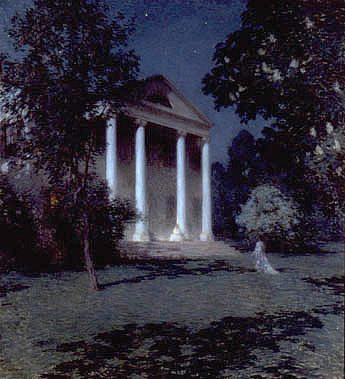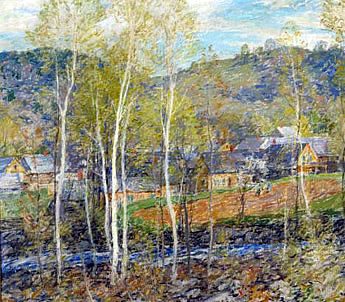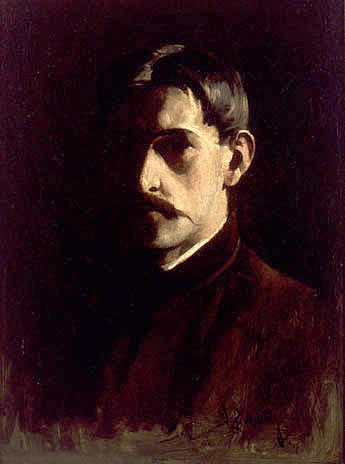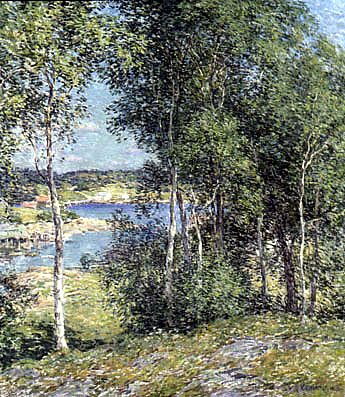Collections
In Situ: The Painted Panels
- The Museum will be closed Sunday, April 9 in observance of Easter.
Willard Metcalf (1858 – 1925)
Birch Trees Beside a Lake
One of four panels that Willard Metcalf completed for the dining room, Birch Trees Beside a Lake is thickly painted, strongly colored, and mostly made up of very short brushstrokes. The effect is a slight twittering of stiff autumn leaves, and there is more movement in the painting besides. The white slender birch trees insistently lead one’s eye from bottom to top. Broad bands of land, trees, and sky counteract that vertical thrust with a strong horizontality, and the stippling that represents leaves moves the eye all around. For this and one other panel, Metcalf chose to use his monogram signature which is a red M in a circle seemingly done with one continuous movement.
WILLARD LEROY METCALF (1858-1925)
BIRCH TREES BESIDE A LAKE, 1907-08
OIL ON WOOD PANEL
GIFT OF THE ARTIST
Drawing Inspiration from our Neighbors to the North
Metcalf made a similar study of birch trees and water while visiting his artist friend Frank Benson at North Haven, Maine, in late August and early September 1907. His painting of that same year, A Family of Birches (in the collection of the Smithsonian American Art Museum in Washington, D.C.), shows a group of birches still in their summer greens, with a river or lake beyond. Moreover, he had that same year painted a large work (36 inches square) called Trembling Leaves,which is referred to in his cashbook (and mentioned by an artist friend) but which has never surfaced. At least one Metcalf scholar theorizes that this dining room panel was either a study for Trembling Leaves or a replication of it. Metcalf said he thought he had painted Trembling Leaves in Old Lyme, but his friend Arthur Hoeber believed the site was East Boothbay Harbor, Maine.
Becoming One of the Era's Leading Landscape Painters
The summer of 1907 had been a bitter one for the artist because Robert Nisbet, a fellow Old Lyme colonist, former student, and contributor of two panels to the dining room, had run off with Metcalf’s wife. With the help of such friends as the Bensons and Florence Griswold, Metcalf eventually pulled himself together and went on to become one of his era’s leading landscape painters.
While he continued to be in touch with Florence Griswold, Metcalf’s return to Old Lyme in the fall of 1907 was his last visit there. He never forgot that Old Lyme had given him the boost to his career that had made all the difference. May Night, his moonlit view of the Griswold House, painted in 1906, won a gold medal at the Corcoran Gallery of Art in Washington and was bought for its permanent collection. His career took off after that.





